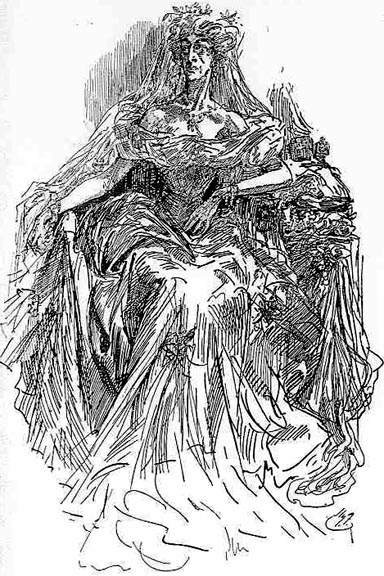Jenny Hall
Verses from the Dhammapada 341
Birth and re-birth are central features of the Wheel of Life. In this article Jenny Hall looks at this process and its implications for Zen practice.

Miss Havisham, in art by Harry Furniss from the library edition of Charles Dickens's Great Expectations..
'Immersed in a stream of craving, men are bound to the round of rebirth.’
This verse points to Birth, the eleventh link in the Twelve-Linked Chain of Dependent Arising. It is connected to the tenth link, Becoming.
When we are born, we are free from self-consciousness, at one with the world. From the time we learn to speak our name, we begin to believe we are ‘someone’. We spend our lives developing and maintaining this belief.
An old English folktale describes a greedy dog that is never satisfied. He devours everything he comes across. One day, he passes a butcher shop. In the window, he spies a delicious, juicy steak and waits outside the shop quietly for a customer to enter. Before long, an elderly woman comes hobbling down the street. Stealthily, the dog creeps into the shop behind her. Whilst the butcher is busy serving the woman, the dog quickly grabs the steak and runs off with it.
As soon as the butcher realises what’s happened, he gives chase , and other villagers join in. The dog, however, knows every back lane. Very soon his pursuers are left far behind, and lose sight of him. It isn’t long before the dog reaches the canal. He is just about to cross the bridge when he sees another dog in the water, also with a steak in its jaws. Not realising it is his own reflection, and longing for that second steak, the dog dives into the water. As he does, the steak falls out of his mouth and sinks to the bottom of the canal.
In the same way the greedy dog is confused by his reflection, so we are deluded by mental images driven by desire and aversion. Attachment to these images gives birth to the delusion of ‘I’. It is as though the dog in the tale above were to seek the second dog and the steak for the rest of its life, restlessly. We are never at peace, born over and over again. Even when we do attain the ‘juicy steak’, it either slips away or doesn’t satisfy for long.
In Great Expectations by Charles Dickens, the reclusive Miss Havisham, jilted at the altar during her youth, continues to wear her wedding dress for decades, yellowing though it is with age. She lives in a tumbledown mansion, the wedding feast table still set as it was that day – the china, glasses and cutlery covered in cobwebs with the rotting cake at centre. Miss Havisham clings to the role of ‘bride’, oblivious to the neglect and debris.
Psychological ‘birth’ is linked to time. Like Miss Havisham, we create the idea of me from past events. We also crave future rebirths.
In my own life, after thirty years of teaching, I embraced retirement with enthusiasm. Soon, however, it became apparent that there was a large gap in my life. This space was actually what my heart yearned for: an opportunity to return to the selfless openness of Buddha-nature. Yet, encouraged by well-meaning enquiries such as, ‘Are you going to travel/move house/study ?’, I decided to fill the gap with a host of new activities. A vague longing for something I couldn’t name continued to simmer.
Zen training encourages us to meet this longing reverently, not to repress or ignore it. When we give ourselves wholeheartedly to its emotional energy, the ‘I’ drops off and the situation opens up. Daily life practice involves such a ‘giving away’ of ourselves over and over again, into whatever arises or is being done. All wishes, hopes and dreams are emptied out. The rebirths of ‘me’ created by these self-beliefs and convictions cease. ‘I’ am no longer separate, but at one with the situation.
Angela Carter said: ‘We travel along the thread of narrative like high-wire artistes. That is our life.’ When we jump off the trapeze, we are free ; when we are no longer obsessed with I, me, mine in the freedom of the Open Heart, its warmth and clarity benefit all.
'Immersed in a stream of craving, men are bound to the round of rebirth.’
This verse points to Birth, the eleventh link in the Twelve-Linked Chain of Dependent Arising. It is connected to the tenth link, Becoming.
When we are born, we are free from self-consciousness, at one with the world. From the time we learn to speak our name, we begin to believe we are ‘someone’. We spend our lives developing and maintaining this belief.
An old English folktale describes a greedy dog that is never satisfied. He devours everything he comes across. One day, he passes a butcher shop. In the window, he spies a delicious, juicy steak and waits outside the shop quietly for a customer to enter. Before long, an elderly woman comes hobbling down the street. Stealthily, the dog creeps into the shop behind her. Whilst the butcher is busy serving the woman, the dog quickly grabs the steak and runs off with it.
As soon as the butcher realises what’s happened, he gives chase , and other villagers join in. The dog, however, knows every back lane. Very soon his pursuers are left far behind, and lose sight of him. It isn’t long before the dog reaches the canal. He is just about to cross the bridge when he sees another dog in the water, also with a steak in its jaws. Not realising it is his own reflection, and longing for that second steak, the dog dives into the water. As he does, the steak falls out of his mouth and sinks to the bottom of the canal.
In the same way the greedy dog is confused by his reflection, so we are deluded by mental images driven by desire and aversion. Attachment to these images gives birth to the delusion of ‘I’. It is as though the dog in the tale above were to seek the second dog and the steak for the rest of its life, restlessly. We are never at peace, born over and over again. Even when we do attain the ‘juicy steak’, it either slips away or doesn’t satisfy for long.
In Great Expectations by Charles Dickens, the reclusive Miss Havisham, jilted at the altar during her youth, continues to wear her wedding dress for decades, yellowing though it is with age. She lives in a tumbledown mansion, the wedding feast table still set as it was that day – the china, glasses and cutlery covered in cobwebs with the rotting cake at centre. Miss Havisham clings to the role of ‘bride’, oblivious to the neglect and debris.
Psychological ‘birth’ is linked to time. Like Miss Havisham, we create the idea of me from past events. We also crave future rebirths.
In my own life, after thirty years of teaching, I embraced retirement with enthusiasm. Soon, however, it became apparent that there was a large gap in my life. This space was actually what my heart yearned for: an opportunity to return to the selfless openness of Buddha-nature. Yet, encouraged by well-meaning enquiries such as, ‘Are you going to travel/move house/study ?’, I decided to fill the gap with a host of new activities. A vague longing for something I couldn’t name continued to simmer.
Zen training encourages us to meet this longing reverently, not to repress or ignore it. When we give ourselves wholeheartedly to its emotional energy, the ‘I’ drops off and the situation opens up. Daily life practice involves such a ‘giving away’ of ourselves over and over again, into whatever arises or is being done. All wishes, hopes and dreams are emptied out. The rebirths of ‘me’ created by these self-beliefs and convictions cease. ‘I’ am no longer separate, but at one with the situation.
Angela Carter said: ‘We travel along the thread of narrative like high-wire artistes. That is our life.’ When we jump off the trapeze, we are free ; when we are no longer obsessed with I, me, mine in the freedom of the Open Heart, its warmth and clarity benefit all.
© Jenny Hall, 2018




































































